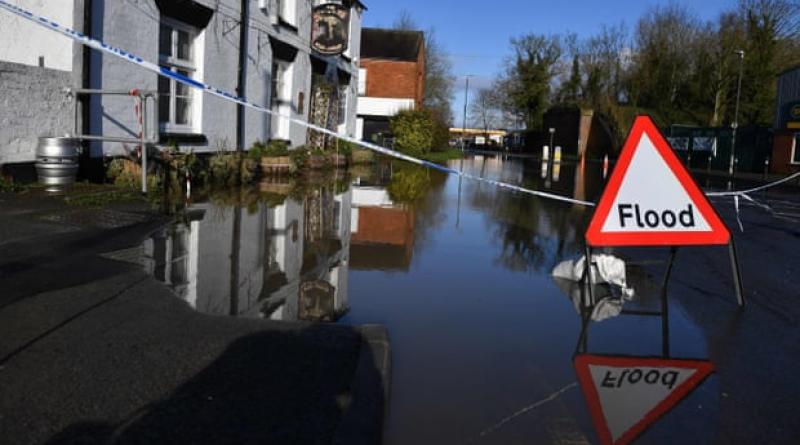With every flood, public anger over the climate crisis is surging.

The fossil-fuel companies know they’ll face increased social stigma unless they change
Sometimes it has felt as if the rain might never stop.
These storms have gone beyond the point of simply being storms now, each blurring into the next to create a strangely end-of-days feeling. Everything is freakishly sodden and swollen, and while the rural flood plain on which I live fortunately hasn’t flooded anything like as badly as some, the rivers are rising alarmingly. Yet still the lashing winds and biblical downpours keep coming. Suddenly the 40 Days of Action campaign that Extinction Rebellion (XR) will launch on Ash Wednesday (26 February), encouraging people to reflect on the environmental consequences of their actions in a kind of green Lent, feels ominously well named.
This week’s stunt in Cambridge, where XR activists dug up Trinity College’s lawn in symbolic protest at the college’s plans to build on land it owns in rural Suffolk, may be just the beginning. Some ask why these activists aren’t out stacking sandbags for the poor householders of the Wye valley, or canoeing through the streets of Mytholmroyd, West Yorkshire, highlighting the risks of a climate crisis that can only mean more freak flooding.
Yet in some ways that was the point of targeting Trinity in the first place. Of all the Cambridge colleges, it’s the one identified by student journalists – using freedom of information requests – as the biggest investor in fossil fuel companies blamed for aggravating the climate crisis. Activists blockaded a research building run by the oil exploration company Schlumberger as well as making holes in the lawn. The clear aim is to make it toxic for institutions to maintain ties to polluting industries; and what makes universities tempting targets is that they’re already being hammered from inside by students raging against what they see as dirty money.
But universities are not alone. This week Amazon chief Jeff Bezos announced he was giving $10bn (£7.7bn) to fight the climate crisis, provoking much the same complaints that greeted BP’s recent vow to go carbon-neutral by 2050: it’s not enough, it’s too vague, it’s just greenwashing. And yes, obviously Bezos should tackle his own company’s carbon footprint first, not to mention treating staff better and paying more tax if he has billions to spare. But until governments have the guts to legislate for all of that, then we are where we are, which is in danger of missing a sea change in corporate life.
Executives in polluting industries haven’t quite reached the nadir of bankers after the financial crash, cold-shouldered at school gates and berated in the street, but the more enlightened can see something similar coming if they’re not careful. When BP’s new chief executive, Bernard Looney, made his carbon neutral announcement, following a similar pledge from British Airways, one key factor cited was pressure from staff. It hurts when your company is spurned by the likes of the Royal Shakespeare Company, which ended its sponsorship deal with BP last year amid climate protests, not long after the actor Mark Rylance compared the firm to an arms dealer or tobacco company. At Amazon, too, Bezos had felt the heat internally with hundreds of staff protesting publicly against the company’s links to oil and gas exploration.
And if younger staff are making waves now, then the climate will be an even harder red line for the graduates these companies need to recruit in future. Two-thirds of American teens now think oil and gas companies create more problems in the world than they solve, according to a report from management consultants EY. Generation Z want to work for ethical companies that make them feel good about themselves, and increasingly see jobs that fuel climate change as morally suspect. Who wants to spend a first date plaintively explaining why working in Big Oil doesn’t make them a bad person?
It may sound ridiculous to their parents’ generation, for whom energy companies were the ones keeping the lights on, but even those with no such qualms must wonder if there’s much future with fossil fuel companies – squeezed between the political rock of legal commitments to hit zero emissions by 2050 and a public hard place that gets harder with every flood or bush fire.
It’s not consumer boycotts driving this, so much as social stigma. It’s tough to go without these companies’ products – there was outrage when a bursar at St John’s College, Oxford, responded to student demands to divest immediately from fossil fuels with a tongue-in-cheek offer to turn their heating off if they were that worried – although the intention was to make the students think, not freeze. But noisy public disapproval costs absolutely nothing, which makes it a powerful weapon.
Add in shareholder pressure, driven by new government rules requiring pension funds to take account of climate risk, and the heat is really on. Suddenly Bezos’s gesture starts to look positively cheap in comparison with being forced to change his business model. Yet, whatever the motivation, it’s still one of the biggest philanthropic donations in recent history, and it shows which way a howling wind is blowing.
How to spend those billions? Bill and Melinda Gates argued this month that private philanthropists should be “swinging for the fences”, taking the big risks governments can’t take with public money. So perhaps the Bezos fund will simply go on a few high-profile scientific gambles.
But the radical choice would be to spend some of it funding movements within corporate and institutional life, pushing the foot-draggers to act while they’re still in control of the situation. Better to move fast than wait for activists to dig up your lawn; better to act now, before the river of public anger bursts its banks.
*Title Photo :
Tewkesbury, Gloucestershire. ‘These storms have gone beyond the point of simply being storms now, each blurring into the next to create a strangely end-of-days feeling.’ Photograph: Ben Stansall/AFP via Getty Images
22 February 2020
The Guardian




